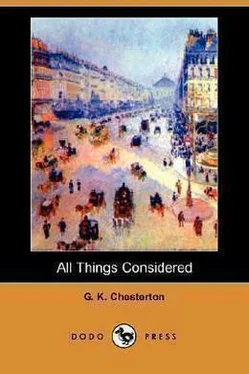Suppose a man tried to find people in London by the names of the places. It would make a fine farce, illustrating our illogicality. Our hero having once realised that Buckingham Street was named after the Buckingham family, would naturally walk into Buckingham Palace in search of the Duke of Buckingham. To his astonishment he would meet somebody quite different. His simple lunar logic would lead him to suppose that if he wanted the Duke of Marlborough (which seems unlikely) he would find him at Marlborough House. He would find the Prince of Wales. When at last he understood that the Marlboroughs live at Blenheim, named after the great Marlborough's victory, he would, no doubt, go there. But he would again find himself in error if, acting upon this principle, he tried to find the Duke of Wellington, and told the cabman to drive to Waterloo. I wonder that no one has written a wild romance about the adventures of such an alien, seeking the great English aristocrats, and only guided by the names; looking for the Duke of Bedford in the town of that name, seeking for some trace of the Duke of Norfolk in Norfolk. He might sail for Wellington in New Zealand to find the ancient seat of the Wellingtons. The last scene might show him trying to learn Welsh in order to converse with the Prince of Wales.
But even if the imaginary traveller knew no alphabet of this earth at all, I think it would still be possible to suppose him seeing a difference between London and Paris, and, upon the whole, the real difference. He would not be able to read the words "Quai Voltaire;" but he would see the sneering statue and the hard, straight roads; without having heard of Voltaire he would understand that the city was Voltairean. He would not know that Fleet Street was named after the Fleet Prison. But the same national spirit which kept the Fleet Prison closed and narrow still keeps Fleet Street closed and narrow. Or, if you will, you may call Fleet Street cosy, and the Fleet Prison cosy. I think I could be more comfortable in the Fleet Prison, in an English way of comfort, than just under the statue of Voltaire. I think that the man from the moon would know France without knowing French; I think that he would know England without having heard the word. For in the last resort all men talk by signs. To talk by statues is to talk by signs; to talk by cities is to talk by signs. Pillars, palaces, cathedrals, temples, pyramids, are an enormous dumb alphabet: as if some giant held up his fingers of stone. The most important things at the last are always said by signs, even if, like the Cross on St. Paul's, they are signs in heaven. If men do not understand signs, they will never understand words.
For my part, I should be inclined to suggest that the chief object of education should be to restore simplicity. If you like to put it so, the chief object of education is not to learn things; nay, the chief object of education is to unlearn things. The chief object of education is to unlearn all the weariness and wickedness of the world and to get back into that state of exhilaration we all instinctively celebrate when we write by preference of children and of boys. If I were an examiner appointed to examine all examiners (which does not at present appear probable), I would not only ask the teachers how much knowledge they had imparted; I would ask them how much splendid and scornful ignorance they had erected, like some royal tower in arms. But, in any case, I would insist that people should have so much simplicity as would enable them to see things suddenly and to see things as they are. I do not care so much whether they can read the names over the shops. I do care very much whether they can read the shops. I do not feel deeply troubled as to whether they can tell where London is on the map so long as they can tell where Brixton is on the way home. I do not even mind whether they can put two and two together in the mathematical sense; I am content if they can put two and two together in the metaphorical sense. But all this longer statement of an obvious view comes back to the metaphor I have employed. I do not care a dump whether they know the alphabet, so long as they know the dumb alphabet.
Unfortunately, I have noticed in many aspects of our popular education that this is not done at all. One teaches our London children to see London with abrupt and simple eyes. And London is far more difficult to see properly than any other place. London is a riddle. Paris is an explanation. The education of the Parisian child is something corresponding to the clear avenues and the exact squares of Paris. When the Parisian boy has done learning about the French reason and the Roman order he can go out and see the thing repeated in the shapes of many shining public places, in the angles of many streets. But when the English boy goes out, after learning about a vague progress and idealism, he cannot see it anywhere. He cannot see anything anywhere, except Sapolio and the Daily Mail . We must either alter London to suit the ideals of our education, or else alter our education to suit the great beauty of London.
It is obvious that there is a great deal of difference between being international and being cosmopolitan. All good men are international. Nearly all bad men are cosmopolitan. If we are to be international we must be national. And it is largely because those who call themselves the friends of peace have not dwelt sufficiently on this distinction that they do not impress the bulk of any of the nations to which they belong. International peace means a peace between nations, not a peace after the destruction of nations, like the Buddhist peace after the destruction of personality. The golden age of the good European is like the heaven of the Christian: it is a place where people will love each other; not like the heaven of the Hindu, a place where they will be each other. And in the case of national character this can be seen in a curious way. It will generally be found, I think, that the more a man really appreciates and admires the soul of another people the less he will attempt to imitate it; he will be conscious that there is something in it too deep and too unmanageable to imitate. The Englishman who has a fancy for France will try to be French; the Englishman who admires France will remain obstinately English. This is to be particularly noticed in the case of our relations with the French, because it is one of the outstanding peculiarities of the French that their vices are all on the surface, and their extraordinary virtues concealed. One might almost say that their vices are the flower of their virtues.
Thus their obscenity is the expression of their passionate love of dragging all things into the light. The avarice of their peasants means the independence of their peasants. What the English call their rudeness in the streets is a phase of their social equality. The worried look of their women is connected with the responsibility of their women; and a certain unconscious brutality of hurry and gesture in the men is related to their inexhaustible and extraordinary military courage. Of all countries, therefore, France is the worst country for a superficial fool to admire. Let a fool hate France: if the fool loves it he will soon be a knave. He will certainly admire it, not only for the things that are not creditable, but actually for the things that are not there. He will admire the grace and indolence of the most industrious people in the world. He will admire the romance and fantasy of the most determinedly respectable and commonplace people in the world. This mistake the Englishman will make if he admires France too hastily; but the mistake that he makes about France will be slight compared with the mistake that he makes about himself. An Englishman who professes really to like French realistic novels, really to be at home in a French modern theatre, really to experience no shock on first seeing the savage French caricatures, is making a mistake very dangerous for his own sincerity. He is admiring something he does not understand. He is reaping where he has not sown, and taking up where he has not laid down; he is trying to taste the fruit when he has never toiled over the tree. He is trying to pluck the exquisite fruit of French cynicism, when he has never tilled the rude but rich soil of French virtue.
Читать дальше








